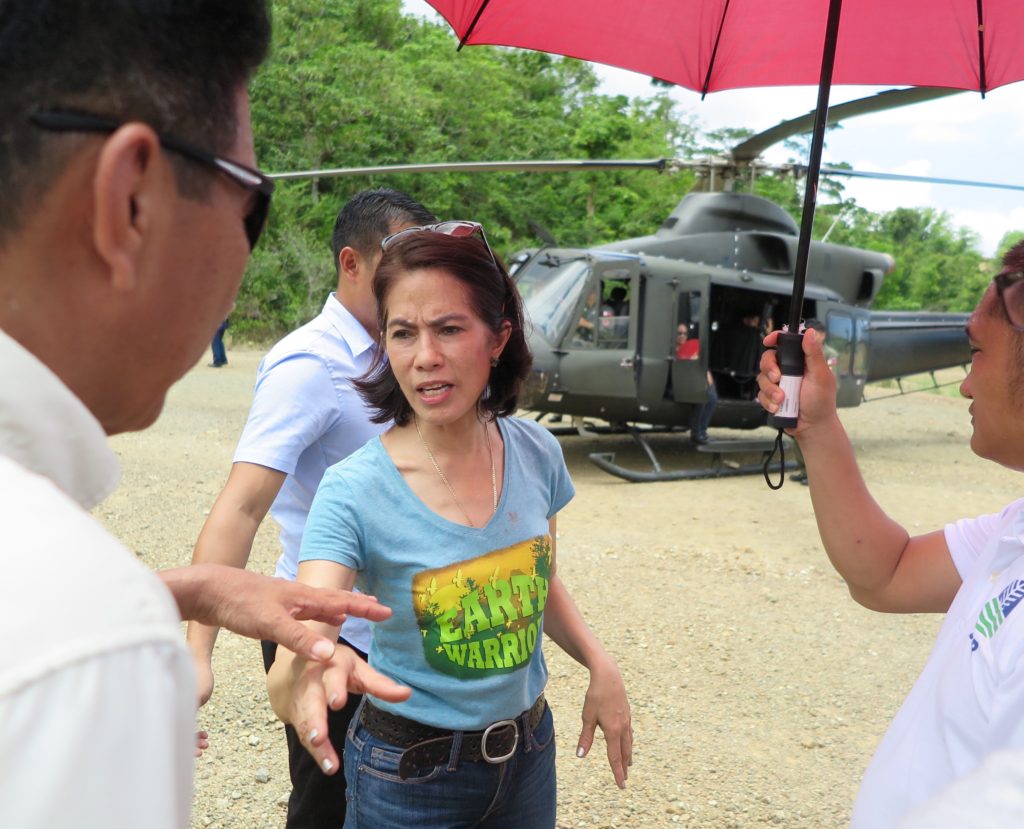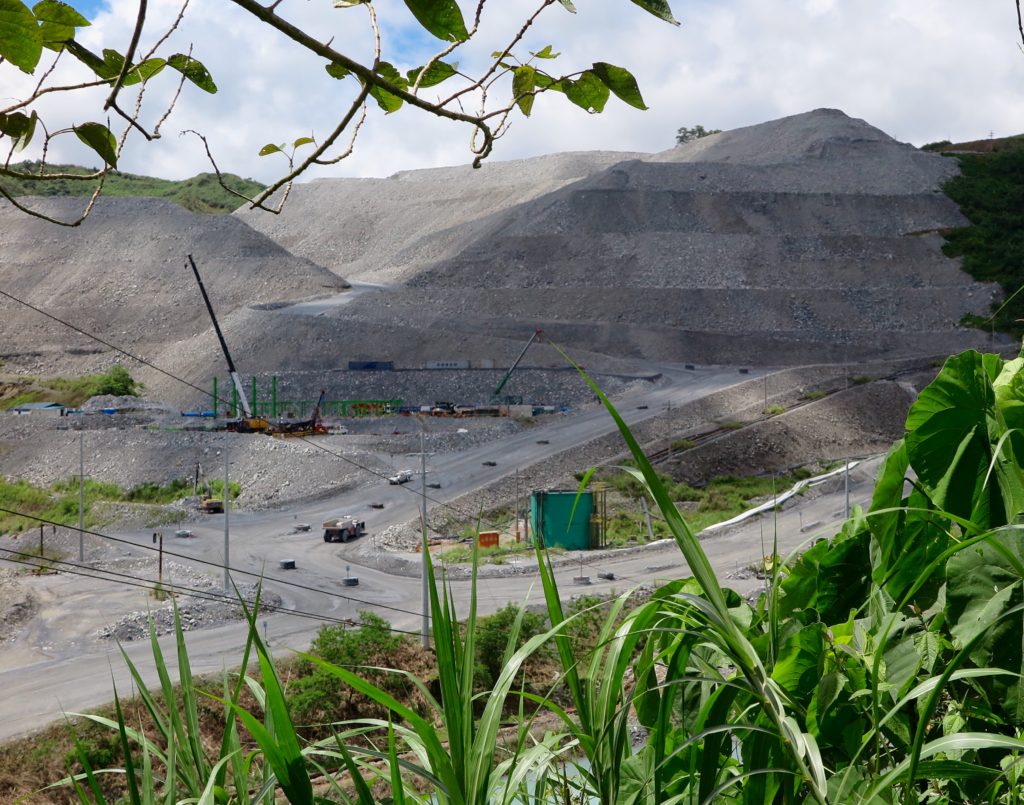
QUEZON CITY, Philippines — On June 20, 2016 Rodrigo Duterte, the newly elected president of the Philippines, asked Gina Lopez to join him in Davao City for an extended conversation about the condition of his country’s land and water.
It turned out to be an eventful encounter. The glib, rough talking, 71-year-old strongman former mayor of Davao City sought help from a 62-year-of woman known inside her wealthy family as the renegade daughter, and outside as an incorruptible foundation director and maverick environmentalist. As head of her family’s ABS-CBN Foundation Lopez led one national campaign to ban open-pit mining. She organized another to clean up a portion of the filthy Pasig River that flows through Manila just to prove it could be done.
When the meeting concluded Duterte extended Lopez an invitation to direct the weak and corruptible Philippine Department of Environment and Natural Resources. She accepted. On July 1, the day after Duterte’s inauguration and with his enthusiastic support, Lopez launched environmental compliance audits of the country’s 41 big hard rock mineral mines that eventually resulted in shutdown or suspension orders against 26 mines. She reviewed government approvals for 339 proposed mines and issued show cause orders to cancel 75 of them. In the last week of April the DENR banned new open-pit mines. The order came seven years after Costa Rica banned new open pit mines, and a month after El Salvador banned all mining.
And all the while during her 10 months in the post Lopez planted bamboo to clear the nation’s waters of pollution, and invested in environmental restoration projects that produced new jobs for indigenous communities. Lopez also started a joint police-military-prosecution task force that curtailed illegal logging and jailed offenders.
Rarely has an environmental officer in any nation so aggressively challenged the industrial community. Not surprisingly Philippine business interests mounted a ferocious counter attack within the Congress and the Duterte administration, which includes several cabinet members close to the mining industry. Two of the nation’s biggest newspapers, owned by mining companies, editorialized against Lopez and her enforcement measures.

Lopez In Office 10 Months
A skilled organizer, Lopez proved to be tenacious. She countered with frequent tours of towns affected by polluting mines, and inspected dozens of mine sites by helicopter. Her exploits were covered in the media and on Lopez’s Facebook page that kept hundreds of thousands of Filipinos informed about the value of the closure orders.
Twice Lopez survived review by a 25-member House-Senate committee, led by a Congressman whose family owns the country’s biggest nickel mines and charged with approving or rejecting cabinet appointments. On May 3, though, on its third try the committee voted in secret and rejected her confirmation. Lopez was done as environment secretary.
Executives in the $2 billion Philippine mining sector, one of the world’s largest, celebrated the committee’s 18-6 vote as a triumph of law over misguided enforcement and arbitrary administration. “We have been agonizing for the past 10 months,” Nelia Halcon, executive vice president of the Chamber of Mines of the Philippines, told reporters. “I just think that we made our point and we were able to discuss the issues we brought forward.”
If the purpose of dumping Lopez, though, was to stifle enforcement and put a lid on the attention that the determined secretary had attracted, it did not work. The committee’s vote prompted three days of intense news coverage. Filipinos viewed Lopez’s ouster as a Legislative setup engineered by lawmakers in the pocket of big business. President Duterte said as much when he suggested the vote against Lopez was secured by lawmakers who accepted “lobby money,” a Philippine term for bribes. Members of the committee denied the charge.
“What I’m doing is life,” Lopez said in an interview three days before the committee vote. “You need to sustain life. Maybe from that comes a deeper and more enlightened perception of what is needed to sustain life, and the role of the environment in the sustenance of life.
“If we kill our land, our water, our air for whatever reason, you kill life. For me, you kill the constitutional right of a Filipino, which is the right to a clean and healthy environment. Here it is forces of greed and selfishness that threaten life. I see the government as the only institution that’s in the position to curtail the forces of greed and selfishness. It’s the role of government to do that.”

Play The Game?
Lopez’s departure has stirred an intriguing discussion among her allies about the secretary’s insistence on being independent and not playing by conventional rules of currying favor to keep her job. A longer term in office, the thinking goes, would have embedded her successes more deeply in the system. Lopez rejects that notion, arguing that having been given the chance to install more oversight of Philippine polluters she wanted to pursue that goal without regard to her job security. “The damage was urgent and I needed to act with urgency,” she said.
There is no doubt, however, that Lopez’s short and uncommonly audacious tenure as environment secretary represents a policy and leadership breakthrough for the Philippine landscape, its bountiful marine resources, and its indigenous people. In the days following her ouster the Catholic Church said it would try to convince Lopez to run for president in 2022, when she turns 69. Lopez responds, “I’m not a politician. That’s not who I am.”
Lopez’s work also transcends the Philippines. Other Asian government officers do not express their goals with nearly as much heart and spirit as Lopez. Still, a good number are just as resolute now in linking environmental safety to gains in their economies and quality of life. In many ways Lopez’s stint as the Philippines’ lead environmental manager is a distillation of the promising shift in the environmental values and economic development principles now taking hold in Asia. After decades of emulating the expensive, resource-wrecking western strategy of economic development, the Philippines and other big Asian nations are pursuing cleaner, resource-conserving economies.
A core element, for instance, of China’s strategy to clear its dirty air, and solve serious water scarcity, has been to cancel 300 coal-fired power plants and build the world’s largest clean energy manufacturing sector.
Vietnam’s Prime Minister Nguyen Xuan Phuc, in mid-April, halted work on the Hoa Sen Group’ $10.6 billion, 4,200-acre steel plant to protect coastal waters.
In 2013, Mongolians re-elected President Tsakhiagiin Elbegdorj, who campaigned on stamping out gold mining operations that were polluting Mongolia’s rivers, and strengthening environmental oversight of big mines. Indonesia’s President Joko Widodo is seizing and sinking foreign trawlers fishing illegally off his country’s coast.
Asia Tilts Green
As recently as 2010 Bangladesh planned to build 19 coal-fired power plants to serve its fast-growing economy. None have been built and several were cancelled as communities resisted being moved in the densely populated country. The government, working with public interest organizations, found an alternative means for supplying power. Bangladesh developed one of the world’s best rooftop solar energy programs.
In 2014, with its yearly economic growth falling to just over 4 percent, India elected Prime Minister Narendra Modi, a strongman leader on a mission of national renewal. His Swachh Bharat cleanup program is convincing Indians to pick up garbage and litter in their unkempt cities and countryside. Modi is investing billions of rupees to scrub human waste from the Ganges River. In December 2016, the Modi government released a draft national energy plan that set a target of generating nearly 60 percent of the country’s electricity, around 275 gigawatts, from wind, solar, biomass, and small hydropower plants by 2027.
Driving Asia’s awakening are ecological and demographic trends that are becoming more virulent and urgent. Fixing terrible air and water pollution is now a significant health and economic issue in Asia. The contest for fish, water, timber, and food is more intense in fast-growing and densely populated countries. Much of Asia is growing noticeably hotter. Well-organized indigenous communities everywhere across the continent refuse to be moved out of the way of big mines and construction projects that consume thousands of acres and are vulnerable to the new and more powerful wrath of Mother Earth — high heat, floods, droughts, typhoons, and earthquakes
It is for those reasons and more that Gerry Arrances, a leader of the Philippine Movement for Climate Justice, said environmental lawyers are prepared to defend the mining shutdown orders in court. “People support what she’s doing and what it means for the Philippines,” he said.
Maria Paz Luna, the DENR undersecretary for legal, legislative affairs and anti-corruption confirmed in an interview that the mining shutdown orders issued by Lopez are not easy to rescind. “If they reverse those positions they have to have a really good reason,” said Luna, the department’s chief legal counsel. “They can’t just lift the law. It’s going to be hard to justify. The open pit mine ban for example. They are going to have to say, ‘No. We can take care of them forever.’
“She said open pit mines are a perpetual liability to government. The mining law states that the secretary can issue permits and set the guidelines. Open pit mining is a method of mining and she has authority to prohibit a method of mining. Open pit mining is seen by her to be environmentally destructive and not acceptable for rehabilitation. This method is not acceptable because future generations are at risk.”
People React
All over the Philippines, residents and local government officials expressed profound frustration at Lopez’s dismissal and fresh resolve to take up the causes that the secretary started. Nueva Vizcaya is a case in point. A mineral rich region in mountainous northern Luzon, the province passed an ordinance in 2014 to ban open pit mining and counted on Secretary Lopez to help enforce it. More than 50 mines are proposed in the province.

“Our people oppose mining. Gina Lopez took up our fight,” said Carlos Padilla, the provincial governor, in an interview. “She showed what is possible with a strong and committed environment secretary. Now we know that mining can be stopped.”
Gina Lopez led an examined and prominent life well before President Duterte summoned her to Davao City. Her family owns the ABS-CBN Corporation, the Philippines’ largest media company, which owns a national television network. As a teenager she was the family’s unconventional daughter, high-spirited and indomitable according to relatives. After leaving college in Boston, Lopez devoted much of her early adulthood traveling to spiritual retreats in India, and working as a missionary for 12 years in Africa. She meditates 90 minutes a day, does not eat meat, and has the slim figure and energy of a schoolgirl.
She also knows and despises corrupt politics and the power of venal government. Her father was jailed for five years by Ferdinand Marcos, the Philippine dictator. ABS-CBN was seized from the family.
Lopez gained prominence as an environmentalist and social activist as the director of the ABS-CBN Foundation. She financed big projects, like the restoration of the 6,750-acre La Mesa Watershed that surrounds Manila’s primary source of drinking water. The project proved her thesis that repairing ruined ecosystems provides big social and economic returns. The centerpiece of the restored watershed is the 82-acre La Mesa Eco Park that employs over 100 people, attracts thousands of visitors a day, and generates enough revenue to plant more trees and invest in other watershed restoration projects.
She was fearless in a nation full of the graves of dead environmental activists; 88 environmentalists were murdered in the Philippines from 2010 to 2015, according to Global Witness, a London human rights organization. One of the victims, Gerry Ortega, was a close friend who was killed in January 2011 while he and Lopez worked to defend the island of Palawan from several proposals for big new mines.
Lopez was the last person Ortega talked to before his death. She honored him by leading a national campaign in 2011 to shut down open pit mines. The activism produced a presidential executive order in 2012 that blocked mining in ecologically sensitive regions and turned Lopez into one of the most influential anti-mining activists in Asia.
Duterte Takes Notice
Duterte needed someone like Lopez to direct the DENR, a big agency that had rarely lived up to its charge to safeguard people and natural resources. Campaign promises to stamp out corruption and kill drug traffickers formed the central ideas of Duterte’s election victory and elevated him to international prominence. Less well known, though, was his allegiance to conserving the country’s breathtaking landscape, its bounty of marine resources, and its indigenous communities.
Duterte was especially vexed by the metal mining industry, which operated with uneven oversight and was tearing up the ground and polluting rivers around Davao City, on Mindanao island, where he’d served as mayor for 22 years. During the election campaign Duterte distributed flyers that displayed aerial photographs of Mindanao mine practices that horsewhipped mountains, leveled forests, and produced mudslides that turned rivers the color of dried blood.
“The mining people must shape up,†Duterte told a big crowd of supporters two weeks before his meeting with Lopez. “They’re spoiling the land. They’re destroying Mindanao. You have to stop.â€
Five years ago, the chairman of the country’s largest mining company publicly accused Lopez of lying about environmental damage from hard rock mining. Lopez stood her ground at a well-attended industry conference and impassively offered unassailable facts to support her view. The confrontation between the slim, serene environmentalist and the red-faced industrialist was videotaped, and attracted national headlines.
It also impressed Duterte. He met with mining executives before election day to issue a warning. He told them that if he won, his administration was prepared to rein in the industry’s rapacious practices with much stricter regulatory enforcement.
“Just take care of the environment,†he said. Then he met with Lopez.
True to form, she surprised her family when she accepted the job. ABS-CBN opposed Duterte’s campaign and has been critical of Duterte’s presidency. “I support him because he believes in helping people,” Lopez says about Duterte. “He’s sincere about that. He really is. It’s in his heart. I admire him for that. We agree on a lot of things. I told him give me one year, maybe two years. I’ll make a difference. If I don’t I’ll leave. He said okay.”
— Keith Schneider

